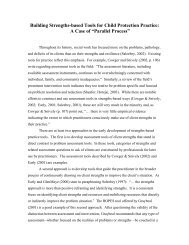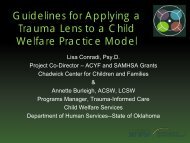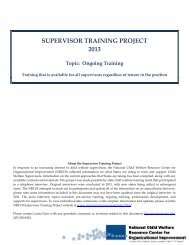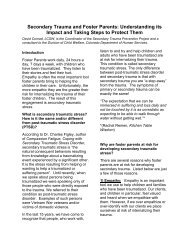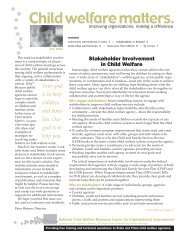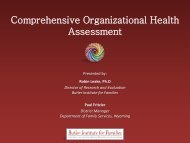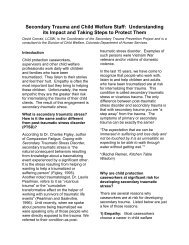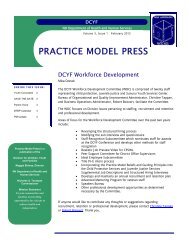supervisor training project 2011 - National Child Welfare Resource ...
supervisor training project 2011 - National Child Welfare Resource ...
supervisor training project 2011 - National Child Welfare Resource ...
Create successful ePaper yourself
Turn your PDF publications into a flip-book with our unique Google optimized e-Paper software.
<strong>training</strong> and technical assistance group is looking to develop more supervision <strong>training</strong><br />
and technical assistance opportunities in the future.<br />
Piñon Coaching and Mentoring: Participant Manual<br />
Piñon Coaching and Mentoring: Trainer Guide<br />
Piñon Coaching and Mentoring: PowerPoint<br />
Oklahoma*<br />
In previous years, Oklahoma offered a mentoring program for <strong>supervisor</strong>s. Mentors<br />
were available to assist with any needs of the <strong>supervisor</strong>s (i.e. guidance on procedures,<br />
advice on cases). Unfortunately, this program has stopped due to budget limitations.<br />
CWTP publishes a Supervisor and Mentor Guide for all child welfare staff. This resource<br />
provides useful materials for <strong>supervisor</strong>s, as well as information about navigating the<br />
State’s child welfare <strong>training</strong> requirements.<br />
Oregon*<br />
Oregon is in their first year of a new mentor program for <strong>supervisor</strong>s. At the close of the<br />
pre‐service Clinical Supervisory Training, <strong>supervisor</strong>s receive an orientation on the<br />
mentoring program. During this orientation, <strong>supervisor</strong>s will receive a list of mentors,<br />
including information about each mentor’s location, demographics, and any<br />
specializations (<strong>supervisor</strong>s interested in a specific supervision area can then choose<br />
based on specialty). All mentors have previous child welfare supervision experience and<br />
must attend <strong>training</strong> on mentoring before they are able to participate in the program.<br />
Supervisors will consult with their superiors to choose an appropriate mentor. Once a<br />
match has been made, the goal is to have a face‐to‐face meeting once per month<br />
(frequency of meeting is flexible in order to suit all <strong>supervisor</strong>s’ needs). The pair will also<br />
meet with a manager on a regular basis. The program is designed to end after one year,<br />
but PSU anticipates that some relationships may extend informally. Participation in the<br />
program is not required, but highly recommended; if a <strong>supervisor</strong> elects not to<br />
participate, his/her <strong>supervisor</strong> must approve the decision. Peter Dahlin, a private<br />
contractor from California, has been hired to provide the <strong>training</strong> for mentors. At<br />
present, <strong>training</strong> has been offered twice. One mentee class has now graduated and is in<br />
the matching process with mentors. Oregon’s <strong>training</strong> partnership is tracking the<br />
implementation of this program carefully to ensure that the program does not become<br />
burdensome for participants.<br />
* 2012 Update: The mentor program is currently on hold as a result of staffing shortages.<br />
Rhode Island<br />
Upper management in DCYF has completed a Leadership Series and Strengths Coaching<br />
<strong>training</strong> in the past. This <strong>training</strong> has produced a group of 15 managers who have chosen<br />
<strong>supervisor</strong>s from their division to coach (usually for a three to four month period). In<br />
this scenario, the coach is out of the <strong>supervisor</strong>’s chain of command, making the<br />
<strong>supervisor</strong>s feel comfortable being open and honest about their work. This program is<br />
currently on hiatus, but the State hopes to revive it in Fall <strong>2011</strong>.<br />
3




